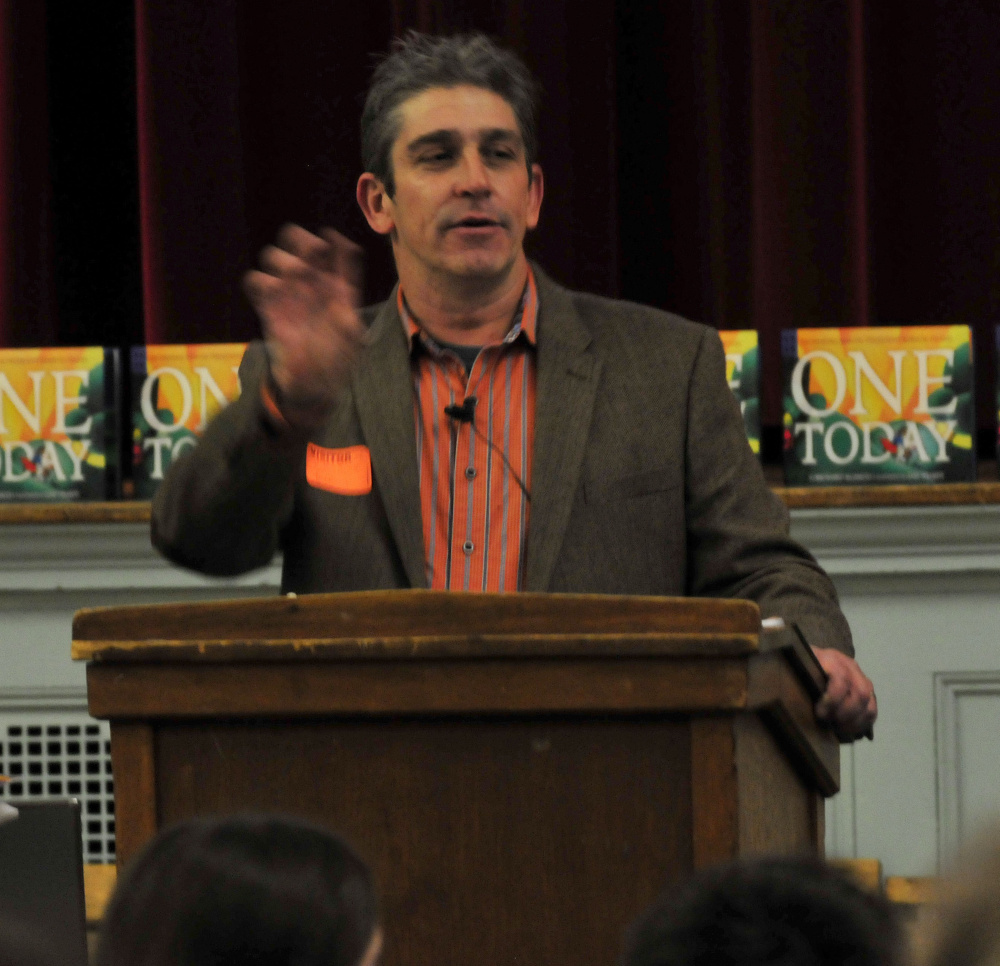Poet Richard Blanco said whether he’s speaking in front of a million people at President Barack Obama’s second inauguration or to a group of young writers on a college campus, the message is the same.
“It is very similar in spirit because it is about connecting poetry and people,” Blanco said by phone Thursday afternoon. “Art is a mirror for us to all look into and see that at the end of the day, we are all the same.”
Blanco, a civil engineer and world-renowned poet, will share his story Saturday as the keynote speaker of the 14th Annual Terry Plunkett Poetry Festival at the University of Maine at Augusta. After his speech, which begins at 2 p.m. in the Jewett Hall Auditorium, Blanco will answer questions and have a discussion and book signing.
Blanco, who splits his time between Bethel and Boston, was the first immigrant, Latino and openly gay inaugural poet when he was selected by Obama to read “One Today.” Other poets who have read during a presidential inauguration include Robert Frost, for John F. Kennedy; Maya Angelou and Miller Williams, for Bill Clinton; and Elizabeth Alexander, for Obama’s first inauguration in 2009.
Blanco’s story is unique. He came to the U.S. just 45 days after being born in Madrid and ultimately was raised and educated in Miami. He received a bachelor’s degree in civil engineering and a master’s degree in creative writing and has been doing both ever since.
“I started writing as an engineer, and that was when I started falling in love with language,” said Blanco, who has written several poetry books and is the education ambassador for the Academy of American Poets.
He said he enjoys visiting schools and working with young writers, but he also spends a lot of his time focused on helping teachers by providing them with resources and lesson plans.
“Many people just haven’t had an authentic experience with poetry, so they have a big misconception about what poetry is and can be,” Blanco said. “It can be an incredible experience.”
Tim Bushika, a senior at the University of Maine at Farmington, doesn’t consider himself a poet, but he said he is looking forward to meeting fellow writers and mentors during the festival. One of the three poems in his senior portfolio was the winner of the University of Maine System Student Poetry Contest.
“I’ve never won a contest before, let alone one for writing, and I couldn’t be more ecstatic,” Bushika said via email about his poem, “Six Days at the Bottom of the Ocean.” “It’s a true honor.”
The creative writing major said the title is a reference to a song of the same name by alternative instrumental rock band Explosions of the Sky. He said he wrote the poem after meditating while listening to the song, imagining spending days at the bottom of the ocean watching the marine life move around.
Bushika thought the poem was the weakest of the three in his portfolio, but he revisited his opinion after hearing he had won the contest.
“After hearing (that poem) had won the contest, I went back and read it and realized how well it stood on its own merits,” Bushika said via email. “I’m proud of my piece and am happy that my self-criticisms aren’t always correct.”
The poetry festival kicks off Friday at UMA with the English Conference and opening of the poetry festival, which is named after Plunkett, an English professor at UMA for more than 30 years. The opening ceremony, beginning at 5:30 p.m. Friday in the Randall Fireplace Lounge, will include several poetry readings, a musical performance and a reception.
Saturday’s events begin at 10 a.m. in the Fireplace Lounge and also include a student panel focusing on Blanco’s memoir and music by UMA jazz students.
Ellen Taylor, an English professor at UMA and one of the festival’s organizers, said the theme of this year’s festival is interdisciplinarity. The festival is free and open to the public.
“As UMA seeks to provide access to education for all, we also provide access to cultural events,” Taylor said. “This poetry festival is a hallmark event on our campus.”
Duff Plunkett, Terry’s son, said the festival aims to be inclusive in every sense of the word. Every year is very different, he said, because organizers try and bring in poets who haven’t taken part in past festivals.
“We welcome longtime poets and new writers from all over the state,” Duff Plunkett said. “I have been told that the festival has been a unifying force among the (UMA) faculty and across the whole University of Maine System. The festival is something the university system and state as a whole can be proud of.”
Terry Plunkett, who died in 1998, was the editor of UMA’s annual literary journal during its 16-year run. His son described him as an old-style editor who would interact with submitting writers by mailing back comments or suggestions.
Blanco said he is there to share his life and his work and connect with people.
“I want to be an example of the richness in life and how it’s all connected,” he said.
Jason Pafundi — 621-5663
Twitter: @jasonpafundiKJ
Send questions/comments to the editors.




Success. Please wait for the page to reload. If the page does not reload within 5 seconds, please refresh the page.
Enter your email and password to access comments.
Hi, to comment on stories you must . This profile is in addition to your subscription and website login.
Already have a commenting profile? .
Invalid username/password.
Please check your email to confirm and complete your registration.
Only subscribers are eligible to post comments. Please subscribe or login first for digital access. Here’s why.
Use the form below to reset your password. When you've submitted your account email, we will send an email with a reset code.